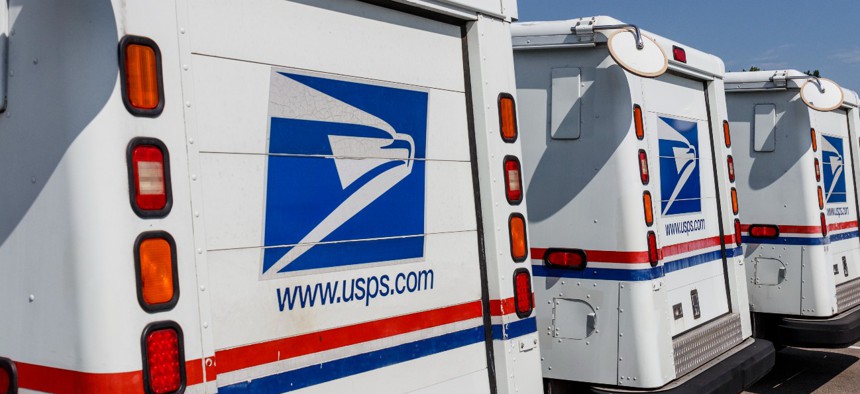
jetcityimage / iStock.com
The Postal Service Has Provided Financial Services to Just 6 Customers Through Its Banking Pilot
The limited program has brought in $35.70 to the mailing agency.
The U.S. Postal Service has provided financial services to just six individuals since it launched a pilot program in September, bringing into question whether the mailing agency will expand the effort that many progressive lawmakers and advocates have pushed for years.
USPS launched its limited foray into banking last fall at four post offices and with little fanfare. It allowed customers at those locations to use “business checks”—that is, checks with a business’ name printed on the check and made out to the individual—to pay for Visa gift cards of up to $500. The six sales using checks between September 13 and January 12 have brought in just $35.70 in fees to the Postal Service, the agency said in a filing with its regulator on Friday, and provided a total value of $548.46 in gift cards.
Postal management declined to say what its plans are with the pilot moving forward, explaining any decisions are pending further evaluation of the results of the initial program. USPS said it will measure the success of the initiative based on customer usage and whether there was a demonstrated benefit to the community. Research from the University of Michigan has found that one-in-four U.S. Census tracts, which are home to 21 million people, do not have any banks within their borders. Advocates for postal banking have highlighted that the private sector often charges high fees for check cashing services and that historically disadvantaged communities are disproportionately impacted by them. The Postal Service is charging $5.95 per check transaction and, for now, is only allowing the checks to be used for gift cards.
USPS has not gone to great efforts to market the availability of its financial services. Before the program gained attention in national media outlets, USPS only announced the availability of the check cashing service through signs in the four affected post offices.
The limited services at four East Coast post offices fall far short of the much more comprehensive suite of financial services many advocates and left-leaning lawmakers have sought for years, but still took USPS in a surprising direction under Postmaster General Louis DeJoy’s rocky tenure.
The program drew criticism from top House Republicans, who accused postal management of developing it "in secret" and said they "strongly object to the concept of postal banking." The lawmakers said DeJoy's approach undermined the trust he built during legislative discussions on a postal reform bill, which won bipartisan support at the committee level. USPS expressed confidence it could win over skeptical lawmakers by explaining the limited nature of the pilot.
When USPS launched the initiative, American Postal Workers Union officials, who worked closely with postal management in setting it up, said the initial sites and services were meant to be a “proof-of-concept” test for the Postal Service. The union was hopeful that USPS would expand the pilot in early 2022, both in terms of services offered and locations where they are available. The easiest areas for expansion would be to allow for gift cards for checks of more than $500. Thousands of post offices already offer Visa gift cards, and management concluded there would be few legal hurdles to simply accepting another form of payment for them. The cards USPS currently has in stock are capped at $500, hence the existing maximum.
At the time it launched the pilot, postal management was looking to both raise the cap on those and allow for the bundling of multiple cards. Other services in discussion were a bill pay product, making the cards branded to the Postal Service and reloadable, and wire transfers from one post office to another. USPS has expressed an openness to setting up its own ATMs, though that may require additional statutory authority and was therefore only expected much further down the road. USPS offered banking services for more than 50 years, but stopped in 1967.
For now, however, postal management is denying it has even entered the financial services world, telling the Postal Regulatory Commission it instead simply began accepting a new form of payment for an existing product. It launched the pilot at APWU’s request, it said, and did not seek prior approval from the commission due to the limited nature of the program. USPS has engaged in limited training for the three-dozen employees at the four impacted post offices, including a service talk and a PowerPoint presentation.







